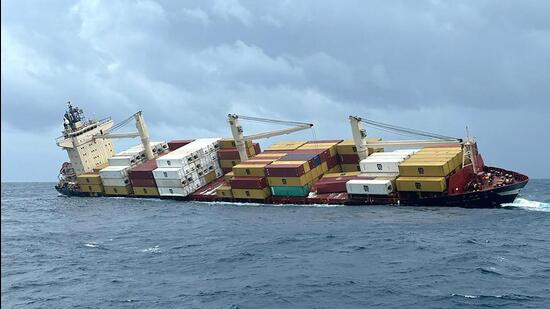Επισκόπηση του συμβάντος
A distressing event occurred off the coast of Kerala when a cargo vessel sank, carrying 640 containers, including 13 containing hazardous materials. This sinking sparked fears of environmental harm along the coastline and led to alerts issued by the local authorities.
Details of the Sinking
The Liberian-flagged ship, known as the MSC ELSA 3, sank approximately 14 nautical miles from Kerala’s coast in the Arabian Sea around 7:50 am. This happened nearly a day after the vessel reported a significant 26-degree list, a marine term indicating its tilt. Fortunately, all 24 crew members were rescued during a coordinated operation between the Indian Coast Guard (ICG) and the Navy.
MSC ELSA 3 is operated by one of the world’s largest shipping companies, highlighting the significant operational concerns this sinking raises not only for environmental reasons but also for global shipping logistics.
Rescue Operations and Initial Response
The ICG promptly activated its pollution response measures amid worries about the ship’s fuel potentially contaminating the fragile marine ecosystem. Aircraft equipped with advanced oil spill detection technology conducted aerial surveillance, while the ICG vessel Saksham was dispatched to the area carrying pollution response gear.
Potential Environmental Hazards
Reports indicated that the vessel was carrying 84.44 metric tonnes of diesel and 367.1 metric tonnes of furnace oil along with hazardous cargo, notably calcium carbide—an extremely reactive chemical that poses fire risks when it interacts with seawater.
Causative Factors and Aftermath
The sinking was reportedly caused by flooding in one of the vessel’s holds. The ship had set sail for Kochi from Vizhinjam port just days before the incident. Following the sinking, the Indian Coast Guard successfully rescued 21 crew members, comprising individuals from various nationalities including Russian, Filipino, Ukrainian, and Georgian, with the remainder being picked up later by the INS Sujata.
Governmental Response
In response to the growing environmental concerns, Kerala’s chief secretary convened an emergency meeting. Officials confirmed that oil leaks from the ship’s fuel tanks were evident, and it was estimated that about 100 containers might have fallen into the sea.
The ICG is actively working to mitigate the oil spill, operating two vessels equipped to contain the oil and utilizing a Dornier aircraft to spray dispersant powder on any leaked oil. There is apprehension that containers drifting from the wreck could reach the beaches of Thiruvananthapuram, Kollam, Alappuzha, and Ernakulam districts. In light of this, a state-wide alert has been issued.
Public Advisory and Pollution Prevention Measures
The state government has urged the public not to engage with unidentified containers or objects in the water and has prohibited fishing activities within a 20-nautical-mile radius of the capsized vessel. Reports from the Indian National Centre for Ocean Information Services (INCOIS) suggest that the contaminated oil could infiltrate coastal areas within 36 to 48 hours, emphasizing the urgent need for proactive measures to minimize environmental impact.
Formation of Rapid Response Teams
In an effort to manage the potential fallout of the incident, the Kerala government has initiated the establishment of Rapid Response Teams (RRTs) under its factories and boilers department. These teams will operate cranes and heavy machinery to safely retrieve containers from the sea and relocate them to safer zones. Additional RRTs may be launched under state pollution control in the event of escalating spill incidents.
Logistics Implications of the Incident
Η βύθιση του MSC ELSA 3 presents a multifaceted challenge that extends beyond immediate environmental concerns. The logistics industry, reliant on seamless shipping routes, may experience disruptions. This incident underscores how vulnerable supply chains can become due to unforeseen events. With hazardous materials involved and the potential for widespread environmental damage, logistics operators must remain vigilant and responsive to evolving scenarios like these.
Συμπέρασμα
In conclusion, the incident involving the sinking vessel off the Kerala coast is a wake-up call for the global logistics sector. The reality is that environmental hazards can arise from shipping activities, affecting not only ecosystems but also the resilience of supply chains around the world. As companies and stakeholders navigate these complexities, efficiently handling cargo logistics becomes paramount.
On platforms like GetTransport.com, such disruptions highlight the importance of securing reliable, affordable freight and cargo solutions. With capabilities to handle various transportation demands—from office relocations to hauling bulky goods—GetTransport.com proves to be a versatile ally in logistics planning and execution. For your next cargo transportation needs, look to the convenience and global network of GetTransport.com. They stand ready to simplify your logistics experience.
Ultimately, while reviews and feedback can provide insight, personal experience is invaluable. The competitive pricing and transparent processes at GetTransport.com enable informed choices without hidden costs. Enjoy the benefits of easy, affordable logistics by partnering with a service like GetTransport.com. Κάντε κράτηση τώρα!

 Η βύθιση πλοίου της Λιβερίας προκαλεί περιβαλλοντικό συναγερμό στην Κεράλα">
Η βύθιση πλοίου της Λιβερίας προκαλεί περιβαλλοντικό συναγερμό στην Κεράλα">